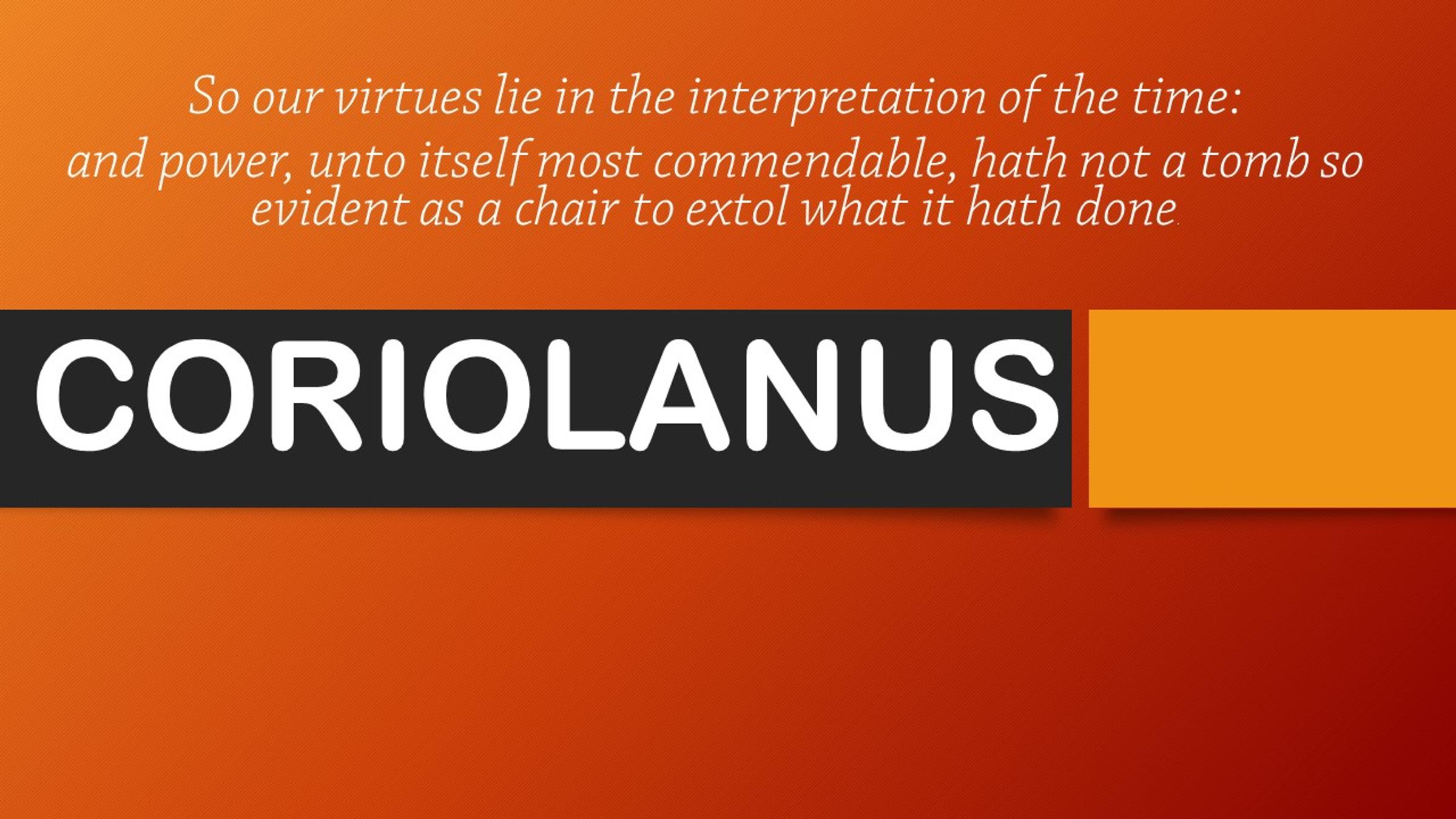excellence in literature

Stephen Milligan
Teacher - VCE Literature
The following is a VCE Literature essay written by Iris Shuttleworth.
Year 12 students had the difficult task of being the first group to navigate the new VCE study design which incorporates literary theory into assessment. While the students are introduced to literary theory in Year 11, their first assessment on this is in Year 12. After six weeks of intensive formative work deconstructing Shakespeare’s Coriolanusand studying Marxist, feminist and psychoanalytic theory, Iris produced this exemplary response. The task asks the students to respond to the topic by formulating their own interpretation from two different theoretical perspectives.
Iris achieved a perfect score for her response by demonstrating all the skills in the matrix criteria for this outcome. Note the way she embodies the Marxist and feminist perspectives without ever naming the theories. Also note the way in which Iris deftly weaves quotations from the play into her analysis under exam conditions. Her efforts and work on this task are to be commended and are testament to her critical abilities and indefatigable pursuit of knowledge.
Essay Topic:
Shakespeare’s Coriolanus subverts conventional notions of power and authority. Discuss.
Iris Shuttleworth
Year 12 - Literature
Shakespeare’s Jacobean tragedy, Coriolanus subverts some conventional notions of power and authority, while also revealing how hegemonic structures are upheld. Specifically, Shakespeare challenges the patriarchal structure of his own time by implying that power can emanate from the female. This patriarchal structure was just as relevant in the Jacobean period as it was in Plutarch’s construction of early Rome. Both the setting of the play and the context in which it was written depended heavily on a rigidly enforced gender binary. Alternatively, Shakespeare challenges the dominant notion of his time that the “common file” were merely “wooden vassals” legitimising their grievances and suggesting a potential for political maturity. This subversive implication undermined the status of his autocratic and aristocratic chief patron, King James I. Finally, Shakespeare reveals how imperialism is used to suppress the class consciousness of the masses. Overall, Coriolanus is deeply concerned with conventional notions of power, what they conceal, and how they are upheld.
Shakespeare subverts conventional notions of gender through his unsettling evocation of female power. This is achieved primarily through his characterisation of the protagonist’s mother, Volumnia. Largely disinterested in the passivity she is expected to perform in the Roman political sphere, Volumnia “fram’d” Martius to act as her surrogate in the masculine worlds of politics and war. The paradigm clearly frustrates her, stating that “anger’s [her] meat” refusing food when she is nourished by resentment. Shakespeare reveals the character’s bloodlust through her claim that if she “had a dozen sons” she “had rather eleven die nobly for their country than one voluptuously surfeits out of action,” expressing a fixation with “valour”. Though it appears that Volumnia is essentially powerless, it is evident that she wields enormous power over her own son. Indeed, rumour has it among the populace that he only went to war to “please his mother,” and even admits that he can be manipulated with her “praises”. This expression of female soft power can be interpreted as revealing a cultural anxiety about strong women, as Jacobean England was still cast in the long shadow of the astonishing, and astonishingly violent reign of Queen Elizabeth I. Volumnia’s obsession with her son’s “bloody brow” is soon transferred to a desire to have her son “perform a part” and adopt a new script of masculinity as a Roman consul. She claims that he “might have been enough the man...with striving less to be so,” implying that he must learn feminine tact from her to function in the body politic. Indeed, it is implied that all of Martius masculine attributes derive from his mother, as she claims that his “valiantness” was hers, he “suckst it from her”. This description of Volumnia’s breasts in phallic terms, as vessels through which masculine qualities emanate, subverts conventional notions of power, as it undermines traditional gender binarism and implies that real power is derived from the mother, as opposed to the homosocial military environment. Finally, Shakespeare subverts early modern ideas of power and gender through the feminist eclipse of Martius at the play’s climax, as Volumnia convinces her son to make “peace” between Rome and Antium. She is hailed as the “life of Rome” and he is torn apart by conspirators. Such an ending evokes ideas of supreme female power, with the ability to create surrogates for the battlefield and discard them at will. Coriolanus subverts traditions notions of power and gender through Shakespeare’s characterisation of the all-powerful Volumnia.
Just as Shakespeare subverts traditional notions of gender, he does the same with class as he offers credibility to the grievances of the masses. This is established in the play’s first scene, as a group of “accounted poor citizens” criticise the economic structures of Rome. Their claim that “the leanness that afflicts” them “is an inventory to particularise [the patrician’s] abundance,” that is to say that food is deliberately withheld from the populace, while the powerful's “storehouses stuffed with grain,” is never disproven. Shakespeare appears to be responding to the Midlands grain riots of his own time, reflecting an emerging peasant class consciousness that revealed the injustices of the feudal system. Although he transposes this class struggle into the early days of Rome, the division between the masses and aristocracy is just as relevant. Shakespeare further legitimises the claims of the plebeians by revealing their individuality, rather than characterising them as a shapeless and furious mass. This is how Martius Coriolanus views them, a starving “mouth” asking why the tribunes “rule not their teeth.” This metaphor illustrates Coriolanus’ conception of them, “dissentious rogues,” scabs on the body politic. Such a haughty perception is not corroborated by Shakespeare himself, who shows how “their wits are so diversely coloured,” thinking for them in response to the famine. Even the patrician Menenius does not so much deny the existence of an unjust economic system, but justify it, “fobbing [the plebeians] off with a pretty tale,” subduing the masses with his fable of the belly. This analogy imagines the citizens as “mutinous members” of the body, rebelling against “the good belly,” which is symbolic of “the Senators of Rome” who provide the members with “public benefit”. The analogy reflects King James I’s autocratic philosophy of the body politic, in which the divine right monarch had an unquestioned place at the head. Shakespeare’s adoption of anatomical imagery throughout conflates class struggles with sexual politics. His legitimisation of plebeian complaints subverts traditions notions of power in class.
Shakespeare might offer sympathy to the plebeians, but more urgently, he reveals how traditional structures of power oppress them. The structures described in the play entirely reflect that of Jacobean England. This oppression is achieved primarily through the state’s use of imperialist narratives to exploit the masses sensibilities. The protagonist and tragic hero, Martius Coriolanus, embodies such an ideology, believing his superiority derives naturally from his military might, likening himself to Rome, “like an osprey to a fish”. He is consistently scornful of the “common file” believing that “who deserves greatness deserves [their] hate,” foreshadowing his own banishment and revealing his own contemptuous perspective on his own people. The protagonist consistently expresses anti-popular, even fascist, sentiment, asking the nobility to “lay aside their ruth/and let [him] use [his] sword”. This autocratic rhetoric is symbolic of broadly held attitudes towards the masses, both at Shakespeare’s time and the centuries before when the play was set. Despite his status as “chief enemy of the people,” is reputation as a war hero causes the plebeians to “forget their ancient malice” towards him. Shakespeare highlights how Martius would like to “hang” the plebeians, disgusted by his burden to “show his wounds,” and yet, because he “received many wounds for his country” the plebeians “let him be consul”. This khaki election underscores how chauvinistic imperialism can distract from class consciousness. The system refuses to reform, not for pragmatic reason, but ideological ones. Martius, in his “pride”, claims that ordinary people “did not deserve corn gratis” as nourishing them would have “nourished disobedience/ fed the ruin of the state”. This obsession with feeding and denial further oppresses the peasant class, casting their dissent off as “the yea and no of general ignorance”. It is clear that the plebeians are not oppressed by necessity, but because of the persistent narrative of chauvinist imperialism. Instead of subverting traditional notions of power and authority, Shakespeare reveals how they are upheld.
To conclude, Shakespeare subverts conventional ideas about power, while revealing how such notions are maintained. He subverts traditional notions of gender and power through his characterisation of Volumnia and subverts autocratic views on class through his sympathetic portrayal of the plebeians. He also highlights how imperialist contempt oppresses ordinary people. It is significant that motifs of anatomy, feeding, and starvation are present in all these power struggles, linking them together as part of the complex human experience. Gender, class and authority cannot be meaningfully separated in Shakespeare’s disturbing and challenging Coriolanus.


